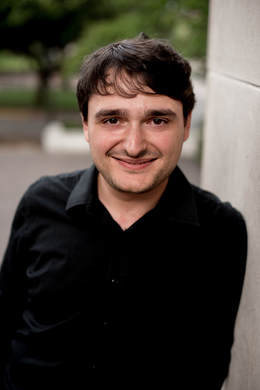 Q: Tell us about how you first became involved in music A: I was nine when I started piano, but I had already begun studying the violin a couple of years earlier. I had felt drawn to the piano however since the age of four, when I discovered the instrument in my grandmother’s house and started picking out melodies by ear. My parents pointed out that you have to be outstandingly good to succeed professionally as a solo pianist, whereas with a string instrument you also have the option of a career in an orchestra. Q: Is anyone else in your family a musician? A: Both my parents, Mario and Daniela, are cellists, and both teach cello at middle and high schools in Italy. My mother also played in the cello section of the Orchestra of Catania’s Teatro Massimo Vincenzo Bellini. They always supported me and were so important for my musical life. All of my brothers (Lorenzo, Marco and Sergio), are all very talented musicians. We often collaborate together and enjoy playing chamber music professionally. My wife Chiara is a wonderful pianist and musician too. I’m so grateful to be able to share the love for this wonderful world of the music with the love of my life. Q: Tell us more about your music education A: Since I started, I fell in love with this wonderful instrument. When I listen to video recordings from when I was 9 years old, I am astounded at myself by the ease and spontaneity of my playing. I don’t know how to explain it: one even hears a degree of musical sensibility that is associated normally with more mature players. All I can say is that I simply wanted to be myself and think only of the music. I have had very good teachers and a wonderful family that gave me the perfect support to be become the person and the artist that I am today. I have my master degree from the Italian Conservatory Vincenzo Bellini in Catania with the maximum votation cum laude in 2007. While I was in Italy, I also studied at the Imola Piano Academy between 2005 to 2008 with great teachers like Lazar Berman, Louis Lortie and many others. After I won the Lodovici Prize at the Busoni Internazional Piano Competition and won the ICMA (International Classical Music Awards) as Young Artist of the Year 2013, I moved to the US to study with Dr. Leone for my second degree (PD-Performer Diploma) at Southern Methodist University. At this time I have only one semester left, and in December I’ll earn my third degree, the AD-Artist Diploma, which is a very special program at SMU reserved for very few special artists. I had the honour to be selected as one of them. Q: Growing up, did you have any influential teachers/professors who guided you towards becoming a professional musician? A: I have always had wonderful teachers since I started playing the piano. Certainly, one of the deepest, important and influential teachers of my life was when I met Dr. Carol Leone at SMU for the first time. She gave me all I needed to grow and become the artist that I’m today…. Of course, I’m also so grateful to the great, world renowned pianist Martha Argerich, for giving me the confidence in many occasions and supporting me in the world of the music. Q: What is your personal teaching philosophy? A: Enormous devotion and love for a job which inevitably involves a certain degree of emotional tension, because emotion lies at the basis of all music-making. If we fail to feel the emotions while we are playing, the music in a certain sense ceases to exist. Of course I consider the age differences between students, but we need to remember that at any age, you can discover and feel music with different emotional grades. I try to transmit energy and enthusiasm, as well as understanding of their different needs, through my teaching. Q: What is your favorite music genre? A: I really love classical music, of course…. but very often I love to listen jazz music played by a great piano player of the past like Oscar Peterson. Q: What is your favorite part about being a piano teacher? A: The excitement that I feel when my students improve after I worked hard with them. Because I’m really busy, I try to select students through auditions and find really talented students. In my opinion, it is better if they are little, so I can work with them and introduce them to this wonderful world from the very beginning. In this moment, I have talented young students. They all have great potential to become wonderful pianists….time will be relative. Q: When you are not teaching, what do you like to do in your spare time? A: I wish I could have spare time… If I could have it, I would love to fish. I remember when I was little, me, my father and my brother Lorenzo used to fish often. There are some things and moments that we can not forget, and one is where we are coming from and what we have done to be where we are now. Q: We know you are originally from Italy- what do you miss about your country? A: I miss all my family, my dogs, the sea and, of course, all the memories of all my life that I spent there, in my country of origin. When you spend a lot of time in a place, Sicily in my case, you have a lot of emotions and feel like there is part of that culture in everything I do. To learn more about Alessandro, click here
0 Comments
-Meredith Manley This week’s blog is inspired by a presentation I attended at this year’s TMTA convention a couple of weeks ago in Waco. The presentation was given by Dr. L Scott Donald, who is a piano teacher in Austin, and he was speaking about repetition and effective practice skills for students. Now, everyone knows that a standard practice strategy is repetition- but what are its limits as far as being effective? Is it possible to have too much repetition when practicing? This relates to the question most parents ask me- how long should their child be practicing and how often? According to motor skill acquisition research and cognitive psychology, we may be guilty of over use of repetition and that habituation (no longer paying attention) can occur with too much repetition. So first let’s talk about the two main types of practice involving repetition: blocked practice and interleaved/random practice. Blocked practice is repeating the same measure/line/piece multiple times in a row (ex: AAAAA, BBBBB, CCCCC), where as interleaved practice involves different segments repeated, but not in a row (ex: ABCABCABC or ABC BCA CBA). As a general rule, I ask my students to repeat a task anywhere from 3-5x, depending on passage length, and then move on to the next part of their assignment with the same repetition guidelines. If I ask them to play it more than that, I find that students burn out on the piece and the enjoyment is lost much quicker. Dr. Donald proposed a few ideas on how to merge both blocked and interleaved practice to create the most efficient paradigm. To prevent burnout, it’s best to ask the student to practice shorter segments, and then alternate between segments- this could be as small as measures. To keep things interesting, ask the student to find different ways to practice the same segment: staccato vs. legato, forte vs. piano, slow vs. fast, etc. One of the most important that he mentioned was to make practicing goal oriented: did you achieve what you intended? I speak about this a lot with parents, in that it’s not necessarily about how long they sit at the piano to practice, but did they achieve the goal that we discussed at the lesson? And lastly, reinforce repetition by turning it into a game, especially for younger students. Dr. Donald’s presentation was in fact entitled: The Art of Repetition: How Beanie Boos Changed My Life. He uses 3 of them to turn practicing into a simple game: if you play the measure/line/passage correctly, a Beanie Boo sits up on the piano. The goal is to play it correctly 3 times to collect all the Beanie Boos, and then you play the passage a 4th time for your Beanie Boo audience. It’s a new spin on an old practice game called “penny practice”, but much more exciting. So if you walk into a lesson to find these guys pictured below on top of your piano, this is what we are doing! So parents, if you are not sure if your child is practicing effectively or even what they are supposed to practice, always check their assignment sheet in their binder and feel free to ask your teacher questions. We would be happy to answer your questions on the first practice day, as we know it is much harder to fix something that was practiced incorrectly. Send your teacher a text with a picture or video if something is unclear. We want your practicing at home to be successful and effective!
If you are interested in learning more about effective practicing, please check out these resources: Carter, Christine and Grahn, Jessica (August, 2016). Optimizing Music Learning: Exploring How Blocked and Interleaved Practice Schedules Affect Advanced Performance. Frontiers in Psychology, Volume 7. Kageyama, Noa (September, 2014). Why the Progress You Make In The Practice Room Seems to Disappear Overnight. The Bulletproof Musician https://bulletproofmusician.com/why-the-progress-in-the-practice-room-seems-to-disappear-overnight/. |
Archives
July 2024
Categories
All
|
|
|
MUSIC SO SIMPLE
|

 RSS Feed
RSS Feed